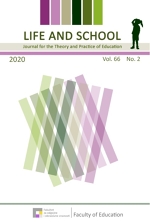HIGH SCHOOLERS FOR HIGH SCHOOLERS AS SUPPORT TO STUDENTS' SOCIAL-EMOTIONAL AND INTERPERSONAL (SEI) COMPETENCES ENFORCEMENT
DOI:
https://doi.org/10.32903/zs.66.2.6Keywords:
evaluation, inter-school collaboration, SEI competences, School for Life, activities of prevention in schoolAbstract
It is with great interest that the modern society of today has been discussing the 'society of knowledge' and the 'society of education', putting great emphasis on the professional and educational role of the teacher and environment within the process of a life-long education of students. The project in question was set up to correspond with the idea of the comprehensive curricular reform of the Croatian education system together with the programme 'School for Life', and it aims to encourage and develop social-emotional as well as interpersonal (SEI) competences in students and teachers, taking into consideration that the competences in question have been proven to have a positive effect on students' academic success and skills improvement, as well as on their general development. A secondary goal of the project was to present good practice examples with special attention paid to activities of prevention in a partner-school, with students as mediators. This research was undertaken as a part of the 'High Schoolers for High Schoolers' project, from October 2018 to April 2019, in form of a single visit to both schools, which included interactive workshops previously prepared by schools. The workshops were conducted by students mediators, that is four senior grade students from XV. gimnazija as members of a psychology-group, and five 11th-grade students mediators from Gimnazija Josipa Slavenskog in Čakovec. Forty-five 9th- and 11th-grade students from XV. gimnazija and seventy-five 9th- and 10th grade students from Gimnazija Josipa Slavenskog participated in the project. A test sample consisted of four students mediators and fortyfive students participants from XV. gimnazija. As for the project evaluation, two short questionnaires were designed, depending on the role of the examinees in the project (student mediator or student participant), with a 5 point Likert scale to be completed at the end of a visit. A descriptive data analysis was conducted using the SPSS 20.0 system, and the process and content evaluation results show a stronger collaboration effect, as well as a stronger satisfaction level in terms of collaboration, in case of students mediators than in case of other students participants, in almost all estimated items. The results support further collaboration of this kind.


